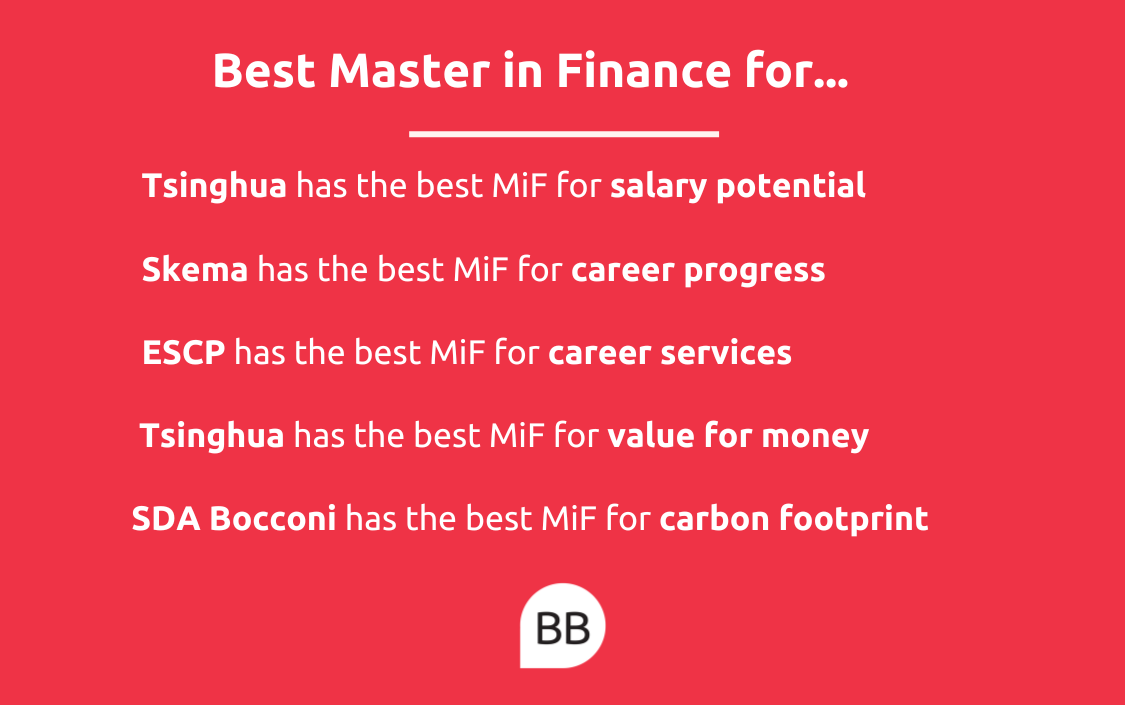If you're interested in upping your financial knowledge and pursuing a career in the highly desirable finance sector, a specialist degree could be the ideal study opportunity for you.
Master in Finance degrees teach a combination of key financial theories and relevant practical skills. This recipe proves to be popular—according to the 2025 GMAC Prospective Student Survey, aspiring business school students have considered the Master in Finance degree as a desirable study option more than any other program over the last decade.
So, how do you choose which school is best to study your Master in Finance? The Financial Master in Finance Ranking lists the best 70 pre-experience Master in Finance degrees (MiF) worldwide, according to a variety of factors including earnings and career outcomes.
Here’s a breakdown of the world's best Master in Finance programs.
Best Masters in Finance | The winners
ESCP Business School continues to lead the FT's Master in Finance ranking, after overtaking HEC Paris in 2023 following the school's 11-year first placed stint. Prior to that, ESCP placed second in the ranking from 2018 to 2022.
ESCP's top position is due to it ranking first for its careers services and alumni network, as well as 97% of its alumni respondents citing that they have achieved their aims since graduating.
Master in Finance graduate salaries are particularly important to the rankings, holding the highest weighting of 16%. On average, graduates from the ESCP Business School Master in Finance program go on to earn an impressive salary of $175,880 three years after graduating. That's a 62% increase compared with their previous earnings.
The highest average salary however is earned by graduates from China's Tsinghua University School of Economics and Management, which ranks third overall, at $225,947.
Out of the top 10, four programs are based in France—ESCP, Skema Business School, ESSEC Business School, and HEC Paris—while three hail from China: Tsinghua University, Shanghai Advanced Institute of Finance at SJTU, and Peking University Guanghua School of Management.
Despite the strong performance of Chinese business schools, European institutions continues to dominate overall. In total, 17 of the top 20 Master in Finance programs are based in Europe, with the remaining three spots held by the Chinese schools.
The University of St Gallen returns to the top 10, climbing back to ninth after slipping to 11th last year. Several schools make major gains: Vlerick Business School jumps eight places, IÉSEG climbs 11, and Luiss advances seven—all breaking into the top 20.
Four schools drop out of the top 20 entirely. EDHEC Business School—ranked sixth in 2024—is absent from this year’s ranking. Católica Lisbon, Warwick, and WHU Otto Beisheim also slide to 23rd, 25th, and 29th respectively.
Just six US programs appear in the rankings, the highest of which is Bentley University, placing 42nd.
Financial Times 2025 Master in Finance Ranking: Top 20
World's best Master in Finance programs | Breakdown
Based on the FT’s ranking metrics, Chinese business schools continue to deliver strong return when breaking down the ranking.
Tsinghua University leads with the highest alumni salary worldwide at $225,947 and ranks first globally for value for money. Shanghai Advanced Institute of Finance places seventh overall and offers the third-highest salary at $209,167, while Peking University Guanghua ranks 10th but edges ahead on salary with an average of $211,370.
HEC Paris, ranked fifth, boasts the highest salary stats among European schools with an 82% salary increase. This equals an average of $176,505 three years after graduating.
The FT ranks Skema first for career progression, followed by ESCP and Católica Porto. This marks the first year in a while that ESCP hasn’t topped the list, after holding the number one spot for six consecutive years.
In terms of the diversity of the Master in Finance cohort, the FT credits business schools for their proportion of women and international students. Audencia, Hult International Business School, and Cranfield School of Management each report 100% international students. Meanwhile, SGH Warsaw School of Economics tops the list for gender diversity, with women making up 58% of the cohort.
However, out of the 70 schools ranked, only eight have achieved or surpassed gender parity.
The Financial Times also credits schools for transparency on their carbon emissions and net zero targets. SDA Bocconi in Milan ranks first, followed by BI Business School in Norway, and Spain's IE Business School in third.
The top business school for value for money is Tsinghua, followed by Toulouse School of Management and Shanghai Advanced Institute of Finance at SJTU.

The FT’s MiF rankings are calculated based on survey responses from alumni who graduated from pre-experience programs three years ago, along with school data. Alumni responses make up 56% of each school's score, with school data constituting the remaining 44%.
Schools are ranked using 19 different categories, broadly covering areas including salary and career progression, diversity, international opportunities, and faculty expertise.
The FT also ranks the best post-experience programs based on graduate respondents from later in their careers. This year, only three schools were evaluated with London Business School ranked number one, followed by University of Cambridge: Judge, and the University of Amsterdam, Amsterdam Business School.



